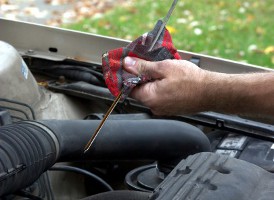 Today’s vehicles are equipped with several gauges and lights on the dashboard that are suppose to help us determine if our cars are working properly. There is a fuel gauge, a check engine light, and an oil pressure warning light. It is very important to pay careful attention to the oil pressure warning.
Today’s vehicles are equipped with several gauges and lights on the dashboard that are suppose to help us determine if our cars are working properly. There is a fuel gauge, a check engine light, and an oil pressure warning light. It is very important to pay careful attention to the oil pressure warning.
The oil pressure warning light in your vehicle is the warning system that alerts you to low oil pressure. A low oil level can cause the oil pressure warning light to appear, so always check your oil level first to see if the oil level is correct. If you’ve checked the oil level and it seems to be fine and the warning remains on, there might be a more serious problem.
Sometimes when your vehicles engine comes to a stop, or drops to an idle, the oil pump, which is powered by your engine, slows down too much and is not pumping enough oil to keep the oil pressure up. If the oil pump is wearing out or isn’t working correctly your oil pressure warning system will engage.
Low oil pressure may also be caused by debris that gets sucked up into the oil pump. The oil pump is the only engine component that is continually lubed with unfiltered oil. The oil doesn’t pass through a filter until after it leaves the pump, so any abrasive debris can pass through the pump before it is trapped by the filter. This debris can restrict the flow of oil and reduce oil pressure.
A plugged oil filter can be another cause of low oil pressure. When the oil leaves the pump, it passes through the filter before going on to the bearings. All filters create a certain amount of resistance to oil flow, but if the filter becomes too clogged with debris, oil flow will be blocked and cause damage to your engine.
The oil pressure warning system may also be activated if the engine is leaking oil from its gaskets or seals. These are a few things that can cause an oil pressure warning. Some are simple or minor repairs if they are caught and dealt with early, but they can become more serious and cause extreme damage to your engine if they are ignored. So have a trusted mechanic or auto repair technician check it out right away.
For all of your Denver Auto Repair needs, trust Express Car Car. Call (303) 691-2760 or stop by our shop today.

Leave a Reply
You must be logged in to post a comment.